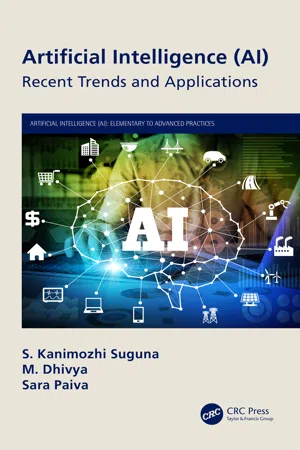
Artificial Intelligence (AI)
Recent Trends and Applications
- 306 pages
- English
- ePUB (mobile friendly)
- Available on iOS & Android
Artificial Intelligence (AI)
Recent Trends and Applications
About this book
This book aims to bring together leading academic scientists, researchers, and research scholars to exchange and share their experiences and research results on all aspects of Artificial Intelligence. The book provides a premier interdisciplinary platform to present practical challenges and adopted solutions.
The book addresses the complete functional framework workflow in Artificial Intelligence technology. It explores the basic and high-level concepts and can serve as a manual for the industry for beginners and the more advanced. It covers intelligent and automated systems and its implications to the real-world, and offers data acquisition and case studies related to data-intensive technologies in AI-based applications.
The book will be of interest to researchers, professionals, scientists, professors, students of computer science engineering, electronics and communications, as well as information technology.
Information
1 Advances in Large-Scale Systems Simulation Modelling Using Multi-Agent Architectures Optimized with Artificial Intelligence Techniques for Improved Concurrency-Supported Scheduling Mechanisms with Application to Wireless Systems Simulation
1.1 Literature Review
1.1.1 Simulation Methodologies Applied in Wireless Communication Systems (WCS)
1.1.1.1 Simulation of WCS
Table of contents
- Cover
- Half-Title
- Series
- Title
- Copyright
- Contents
- Preface
- Acknowledgements
- Editor biographies
- Contributors
- Chapter 1 Advances in Large-Scale Systems Simulation Modelling Using Multi-Agent Architectures Optimized with Artificial Intelligence Techniques for Improved Concurrency-Supported Scheduling Mechanisms with Application to Wireless Systems Simulation
- Chapter 2 Let’s Find Out: Why Do Users React Differently to Applications Infused with AI Algorithms?
- Chapter 3 AI vs. Machine Learning vs. Deep Learning
- Chapter 4 AI and Big Data: Ethical Reasoning and Responsibility
- Chapter 5 Online Liquid Level Estimation in Dynamic Environments Using Artificial Neural Network
- Chapter 6 Computer Vision Concepts and Applications
- Chapter 7 Generative Adversarial Network: Concepts, Variants, and Applications
- Chapter 8 Detection and Classification of Power Quality Disturbances in Smart Grids Using Artificial Intelligence Methods
- Chapter 9 Robust Design of Artificial Neural Network Methodology to Solve the Inverse Kinematics of a Manipulator of 6 DOF
- Chapter 10 Generative Adversarial Network and Its Applications
- Chapter 11 Applications of Artificial Intelligence in Environmental Science
- Chapter 12 A Genetic Algorithm-based Artificial Intelligence Solution for Optimizing E-Commerce Logistics Vehicle Routing
- Chapter 13 Application of Machine Learning for Fault Detection and Energy Efficiency Improvement in HVAC Application
- Chapter 14 Smart City Using Artificial Intelligence Enabled by IoT
- Chapter 15 AI Emerging Communication and Computing
- Index
Frequently asked questions
- Essential is ideal for learners and professionals who enjoy exploring a wide range of subjects. Access the Essential Library with 800,000+ trusted titles and best-sellers across business, personal growth, and the humanities. Includes unlimited reading time and Standard Read Aloud voice.
- Complete: Perfect for advanced learners and researchers needing full, unrestricted access. Unlock 1.4M+ books across hundreds of subjects, including academic and specialized titles. The Complete Plan also includes advanced features like Premium Read Aloud and Research Assistant.
Please note we cannot support devices running on iOS 13 and Android 7 or earlier. Learn more about using the app